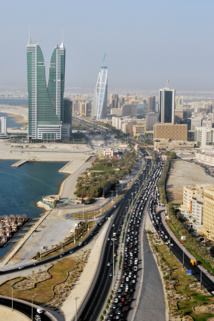
Source: Jayson De Leon, derived via Wikipedia
In his address to GCC counterparts, Saudi Crown Prince Salman bin Abdul Aziz, in the place of King Abdullah who stayed away for health reasons, delivered an appeal for unity.
"We aspire to a strong union with integrated economies, a joint foreign policy and a common defence system," he said.
Sheikh Sabah al-Ahmad al-Sabah, Kuwait's emir, called for humanitarian aid for Syrian civilians and urged Iran to reach a peaceful settlement with neighbours, including over three Gulf islands in dispute with the United Arab Emirates (UAE).
The two-day summit is to focus on strengthening "Gulf unity... especially politically, economically, in defence, security and culturally," Bahrain's Foreign Minister Sheikh Khaled bin Ahmed Al-Khalifa said on Sunday.
The meeting is also expected to discuss the conflict roiling Syria and the situation in Yemen.
However, four of the six heads of state will not attend the annual gathering, which takes place in the wake of last year's Arab Spring uprisings which swept several Arab states but not the Gulf monarchies.
The GCC states -- Bahrain, Kuwait, Oman, Qatar, the UAE and Saudi Arabia -- have a combined population of around 46 million, the majority of whom are foreigners.
Their overall gross domestic product in 2011 amounted to 1.37 trillion dollars, a diplomatic source said.
In 2003, they launched a symbolic customs union which has been beset with problems, failing to meet its target date of 2005, with the transition period systematically extended to 2015.
And a monetary union announced in 2009 with the aim of creating a common currency has also failed to materialise, with just four nations -- Bahrain, Kuwait, Qatar and Saudi Arabia -- signing up to it.
The six monarchies will also discuss plans to expand a security treaty they signed in 1994 with the aim of increasing security cooperation in the face of the Arab uprisings, sources said.
-------------------------------------------------------------------------------------------------
"We aspire to a strong union with integrated economies, a joint foreign policy and a common defence system," he said.
Sheikh Sabah al-Ahmad al-Sabah, Kuwait's emir, called for humanitarian aid for Syrian civilians and urged Iran to reach a peaceful settlement with neighbours, including over three Gulf islands in dispute with the United Arab Emirates (UAE).
The two-day summit is to focus on strengthening "Gulf unity... especially politically, economically, in defence, security and culturally," Bahrain's Foreign Minister Sheikh Khaled bin Ahmed Al-Khalifa said on Sunday.
The meeting is also expected to discuss the conflict roiling Syria and the situation in Yemen.
However, four of the six heads of state will not attend the annual gathering, which takes place in the wake of last year's Arab Spring uprisings which swept several Arab states but not the Gulf monarchies.
The GCC states -- Bahrain, Kuwait, Oman, Qatar, the UAE and Saudi Arabia -- have a combined population of around 46 million, the majority of whom are foreigners.
Their overall gross domestic product in 2011 amounted to 1.37 trillion dollars, a diplomatic source said.
In 2003, they launched a symbolic customs union which has been beset with problems, failing to meet its target date of 2005, with the transition period systematically extended to 2015.
And a monetary union announced in 2009 with the aim of creating a common currency has also failed to materialise, with just four nations -- Bahrain, Kuwait, Qatar and Saudi Arabia -- signing up to it.
The six monarchies will also discuss plans to expand a security treaty they signed in 1994 with the aim of increasing security cooperation in the face of the Arab uprisings, sources said.
-------------------------------------------------------------------------------------------------









 Home
Home Politics
Politics









